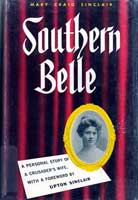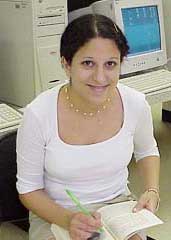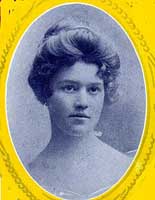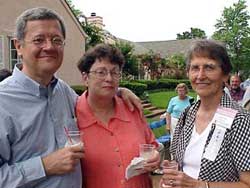Major Works
- Sonnets 1920’s?
- Southern Belle 1957, 1962 Memorial Edition
- Sylvia 1913, published under Upton Sinclair’s name
Mary Craig Kimbrough Sinclair: A Biography
By Suzie Sinno (SHS)
Mary Craig Kimbrough Sinclair, born on February 12, 1883, in Greenwood, Mississippi, was raised in the Southern style. Being the oldest child of Judge Allen McCaskill and Mary Hunter Southworth Kimbrough, She was a member of a prominent, old Mississippi family. She started her life out innocently on her father’s Delta plantation. As a child she once sat on Jefferson Davis’s knee. Craig (as she was called) was taught to respect God and the Negro, whom she considered family. At the age of thirteen, she attended the Mississippi State College for Women in Columbus, where she was the first girl ever enrolled who got a grade of 100 in the course of English. She later transferred to the Gardner School for Young Ladies in New York, graduating in 1900.
Kimbrough’s youth was full of parties and beaux, one of whom she planned and expected to marry. Her father abruptly forbid the marriage, and she was convinced by her mother to start writing. She wrote a biography on Winnie Davis, Jefferson Davis’s daughter, but she never published the biography because, in her words, the book “lacked reality.” She could not write any part of it in a straightforward way without offending someone.
Accompanying her ill mother to the Kellogg sanitarium in Battle Creek, she met the well-known author Upton Sinclair. He agreed to counsel her in her writing; and later in New York, he guided her on a novel she was writing about a Southern girl whom she portrayed using many of her own experiences. The book was published as Sylvia in 1913 under Sinclair’s name. In 1913, her relationship with Upton Sinclair resulted in the two marrying. It was a second marriage for Upton Sinclair. Her father disapproved of the marriage and became estranged from his daughter.
Kimbrough moved North with her crusading, activist husband Sinclair. She joined him in his struggles to “redeem the disinherited of the earth, ” according to her autobiography, and joined with him in writing many of his books. He was a Socialist and muckraker whose novel The Jungle (1906) was an expose of the meatpacking industry. Later, in 1943, he won the Pulitzer Prize for his novel Dragon’s Teeth. Through him, she became involved in social causes and came to know many of America’s aristocrats, including many distinguished figures in the literary and political worlds. She accompanied her husband throughout United States and Europe, and they became close friends with as Albert Einstein, Bertrand Russell, George Bernard Shaw, Theodore Dreiser, H.L. Mencken, Charlie Chaplin, and Douglas Fairbanks.
Kimbrough began to experience a world of demonstrations, distress, and political pamphleteering for the liberal causes she and her husband supported, including a yearlong entanglement in a bitter political campaign for the California governorship. According to Peggy Whitman Prenshaw, she “gave up her moonlight and magnolias for Upton, but never her grace.” Her marriage of 48 years to Upton Sinclair is the heart of her autobiography Southern Belle.
On April 26 1961, Mary Craig Kimbrough Sinclair suffered a fatal stroke and died in Pasadena, California. According to the obituary that appeared in the Jackson Clarion-Ledger, she left instructions for her body to return to her native state: “I want again to be part of the soil of Mississippi. I want to be buried there.” Her forty-eight years of marriage to Upton Sinclair were filled with happiness. Upton Sinclair said she was “the help meet of a man who set out to help in the ending of poverty and war in the world.” It included many crusades in which he bankrupted himself and her as well. She helped him to write and publish three million books and pamphlets. Sinclair called her as “the loveliest women I have ever known.”
Reviews
A Review of Southern Belle
by Suzie Sinno (SHS)
As Upton Sinclair says, “This is the story of a Southern belle, told by a real one.” The autobiography of Mary Craig Kimbrough Sinclair takes us from the bygone era of the cotton fields, nannies, mammies, butlers, and cooks to the modern era of today. Craig describes her early life in the Mississippi Delta as one of privilege, money, and power where she was raised to be a Southern Belle. She could possibly be described as an early feminist as she takes up the crusades of Upton Sinclair. She can also be depicted as one of the Southern Belles of today who draws her strength from their family’s past to overcome and conquer modern adversity. Whether it was love or love of adventure, her marriage to Upton Sinclair was a show of her individuality.
The book begins with an introduction of Craig’s family history. Her family background is one of the wealthy plantation elite of the Mississippi Delta at the turn of the 20th century. She shares antidotes of her family with the reader, which explain her Southernness. She goes on to describe her first love as one of a powerful emotion. Her father made her break off her first engagement, insisting that she should not give her life away so early. She did not agree with her father and went into a little depression, which is when she began her genuine writing.
While accompanying her mother to Battle Creek, the author meets her future husband, Upton Sinclair. Mrs. Kimbrough and Craig listened to a speech by the notable author of The Jungle, an expose of the meat packing industry. Later when she runs into Upton, she asks his opinion of her first book, and he agrees to teach and counsel her on her writing. She not only falls in love with Sinclair’s writing, but also she falls in love with him.
Being married to such a reformer as Upton Sinclair lead to many adventurous stories. Craig was sure to liven every single one. She explained how her world changed into a world of character and standing up for one’s rights. Even though she supported him throughout their marriage, she sometimes wondered what she had gotten herself into. But it is all in good fun as she never lost hope in her spouse. Even though she vindicated him, her family felt a little differently. Her mother grew to love her son-in-law, but her father refused to accept Upton, insisting that Craig could do better than someone who drags his wife all over the place to get points across. She hoped desperately for a letter from her father inviting her home, but one never came. But, of course, Craig loved Upton and refused to be persuaded by her father’s preaching.
Craig explains how impressed she was with her husband that she often said, “How can one stand to such a fellow?” He was determined to help end poverty and end war in the world. He began to lead rallies and speak at big conventions. This required a lot of travel, which was tough on a lady. But she began to realize something very important, if one does not fulfill his dream, then that individual will be very unhappy. She told of many wealthy people that she knew who were sad dreamers and who were unsatisfied.
Craig continues to tell of how the The Great Muckraking Era drew to a close. But Upton did not give up or lose hope. He took it as an opportunity to try and get more out of what was given. He still gave speeches, and Craig helped him write over three million books and pamphlets promoting his beliefs.
Craig keeps the reader’s attention and puts a lot of hard work in making her unique life one worth reading. One can only wonder why she did not publish more than she did because because it is obvious that she is a marvelous writer. Being a Southerner, one can relate to her book and understand her hardships, opportunities, and high points. But her book also tells of change and how one copes for the sake of love. Anyone can understand this, which is why this book would appeal to almost anybody.
A Letter from Peggy Prenshaw May 8, 2000
Writer of the afterword in Sinclair’s Book
Dear Suzie,
How nice to hear that you’ve read and enjoyed Southern Belle. A few other texts that you might enjoy are The Autobiography of Upton Sinclair and Mental Radio by Upton Sinclair (this is an account of the extrasensory experiments that Craig Sinclair and Upton conducted and wrote about). There is also Leon Harris’s biography of Upton Sinclair (entitled Upton Sinclair: American Rebel), but I find Harris very biased in his commentary on Craig. I think he got most of his information from Sinclair’s son (the son of his first marriage), who clearly never got along with his stepmother Craig.
Having spent a week or more reading through the manuscripts in the Sinclair collection at the University of Indiana, I know that Craig contributed significantly to Upton’s literary career- there is evidence of many revised manuscripts in Craig, although he does in one passage acknowledge that she had a more developed “aesthetic sense” than Upton. I think she had considerable literary ability, which she mainly employed in the service of Upton’s career, helping him write, revise, manage affairs editors, etc. And I’m pleased to see that her book is again in print and being read for the interesting account of a period of American social history that it is.
Good luck on your project!
Peggy Prenshaw
Bibliography
- Lloyd, James B. ed. Lives of Mississippi Authors 1817-1967. Jackson, MS: University Press of MS, 1981.
- Prenshaw, Peggy. Letter to Susie Sinno. 8 May 2000.
- Sinclair, Mary Craig. Southern Belle. Jackson, MS: Banner Books,1999.
- “Southern Belle.” University Press of Mississippi. <http://WWW.UPress.State.MS.US/books/s/southern_belle.html>.



